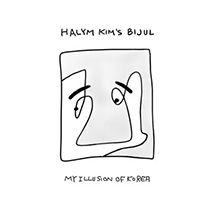June 11, 2021
My Illusion of Korea - Halym Kim's Bijul
 Label: Barefoot Records
Label: Barefoot Records
Catalog #: BFREC070CD
Country: Denmark
Release Date: June 12, 2021
Media: cd or digital download
bandcamp.com entry
discogs.com entry
"My Illusion of Korea" is a new recording of four tracks featuring an experimental jazz quintet assembled by drummer, Halym Kim. Kim is accompanied by Nana Pi on tenor saxophone, Eloi Calame on bass clarinet, Erik Kimestad on trumpet and Grzegorz Tarwid on piano. The music represents an example of intersectionality in which Kim's contemplations on the traditional music and philosophy of South Korea are expressed through the modern experimental and improvisational manifestation of a Copenhagen-based jazz ensemble.
Without this external cue, a listener would be hard pressed to identify by ear the Korean-influence. Certainly there is no reliance on obvious cultural signals, neither in terms of instrumentation nor musical phrasing. Of course the opacity is intentional; the title of the release, "My Illusion of Korea" suggests a distance between the performers and the subject of the contemplation. This distance is conveyed in the music. Still, an attentive listener seeking signs of this connection can imagine particular passages trace their origins back to a Korean inspiration. As likely as not this is an exercise in apophenia, extracting meaning from otherwise random data, but, we at the Poison Pie Publishing House, are devotees of apophenia! (One need look no further than the Oracle of Hebeloma, since prognostication is an activity of pure apophenia.)
We imagine that the musical sequences, in which one of the instruments (saxophone or bass clarinet) appears in a duo with the drums, as a kind of contemporary version of pansori, a traditional narrative performance involving a duo of vocalist and drummer. Here the woodwind instrument takes the role of the vocalist. During these duets, the drums provide a pacing that responds to the breathing of the reed player. These duets are brief in duration. In at least one instance, the duet ends in a cacophonic return of the entire ensemble. Perhaps this is reminiscent of the traditional practice of pansori singers training beside waterfalls to allow their voice to rise above the thunderous crash of water.
In another place, we hear the bass clarinet evoke the patient melody of a daegeum flute. Eventually these transient reflections lead back to the playing of the entire group, where mental associations between the experimental improvisation and Korean traditions are beyond our ability to perceive. Perhaps, some of these ideas were intended by Kim and his collaborators, while others we have just made up. It really doesn't make any difference. We return to a thought on a characteristic of creative music from the American trombonist and composer, George Lewis, which we have quoted in previous reviews. "I feel that when people are listening to music, they can do it because of the sense of empathy that allows them to respond to the creativity of other people by feeling their own creativity. In other words, those neurons start firing and those experiences, those bodily feelings start to resonate with the creativity that's coming from outside because they've got it within them."* Even imagining connections in the music that were not originally intended by the creators is a consequence of the kind of music they released into the world.
Along another direction, the title of the second track, "Where do you really come from?" captures a modern, casual racism, familiar to persons of color in white majority countries. In this respect, the track is a sort of cultural heir to themes in Butch Morris' improvisational album, Current Trends In Racism In Modern America, (Sound Aspects Records, 1985). After nine minutes, the track comes to a calamitous end on the piano. One imagines a conversation between ostensibly friends brought to a discordant close by this seemingly innocuous question.
With "My Illusion of Korea" Halym Kim's Bijul renders a perception of Korea and interprets it through an experimental jazz lens. The music is as inventive and original as is the concept that inspired it. We hope to hear more from Halym Kim in the future.
* George E. Lewis, interview with Lloyd Peterson, from Music and the Creative Spirit: Innovators in Jazz, Improvisation and the Avant Garde, Scarecrow Press, Lanham, MD, 2006.

